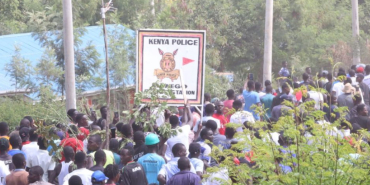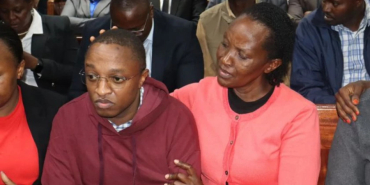Passaris’s Protest Bill Mirrors Demo Rules Drafted by Kindiki

A legislative proposal currently before the Kenyan parliament is generating significant controversy over its potential impact on civil liberties and democratic expression.
The Public Order (Amendment) Bill 2025, sponsored by Nairobi Woman Representative Esther Passaris, seeks to restrict public gatherings and demonstrations within 100 metres of Parliament, court buildings, and other designated protected areas. The Bill proposes establishing designated protest zones and imposing penalties, including fines of up to KSh100,000 or imprisonment for up to three months, for violations. It also empowers the Interior Cabinet Secretary, in consultation with county governments, to demarcate areas where demonstrations may legally occur.
Critics argue that the legislation infringes upon Article 37 of the Constitution, which guarantees the freedom to assemble, demonstrate, picket, and petition public authorities. The timing of the Bill has heightened its contentious nature. It follows a series of Gen Z-led protests across the country, demanding increased government accountability and transparency. These demonstrations, though largely peaceful, have sometimes resulted in confrontations with law enforcement, causing injuries, deaths, and property damage.
The government has faced both domestic and international criticism for its handling of these protests, with allegations of excessive force and unlawful detentions against security agencies. While Passaris is officially listed as the Bill's sponsor, questions have emerged regarding its origins. Parliamentary records and past statements suggest that the initiative may have originated with Deputy President Kithure Kindiki during his tenure as Interior Cabinet Secretary.
During his vetting before the Committee on Appointments in August 2024, Kindiki revealed that he had finalised draft regulations to the Public Order Act before his dismissal as Interior CS. He said these regulations were designed to facilitate the constitutional right to protest while maintaining public order. "Before I was dismissed on July 11, 2024, I had actually finalised the draft regulations... to give effect to enjoyment of that right to picket," he told the committee, responding to criticism from National Assembly Majority Leader Kimani Ichung'wah regarding the lack of designated protest zones and the resulting clashes between police and demonstrators.
While Kindiki's proposal focused on regulatory instruments, Passaris's Bill escalates the matter into statutory reform. This shift from administrative guidelines to legislative amendment has raised concerns about the intent and implications of the proposal. Legal analysts warn that codifying such restrictions could set a dangerous precedent, effectively criminalising spontaneous protests and curtailing the visibility of dissent near centres of power.
Passaris has not yet publicly addressed inquiries about the Bill's origins. However, her past affiliations and political trajectory have fuelled speculation about external influence. City lawyer David Ochami questioned her authorship, suggesting the MP may have been chosen to present a government-backed initiative. "She could not have imagined, conceptualised or drafted this Bill," he said, alleging that party operatives from ODM or UDA may have orchestrated the move.
The controversy is further compounded by Passaris's previous public image as a champion of civic engagement. Her pivot towards legislation perceived as limiting civil liberties has been described by some as an ideological contradiction. Her recent defence of Deputy Inspector-General of Police Eliud Lagat, following the death of teacher Albert Ojwang in police custody, has drawn sharp rebuke on social media, reinforcing perceptions of alignment with state security interests.
Supporters of the Bill argue it is a necessary response to the chaos witnessed during recent protests. Kindiki, in his vetting remarks, stressed the need for structured demonstrations that do not infringe on the rights of others or disrupt essential government operations. He proposed that police be obligated to escort protesters and ensure their safety, while also preventing disorder.
"The right to demonstrate must be balanced with responsibility," he said, adding that institutions should designate areas within their precincts for peaceful assembly and petitioning.








Add new comment